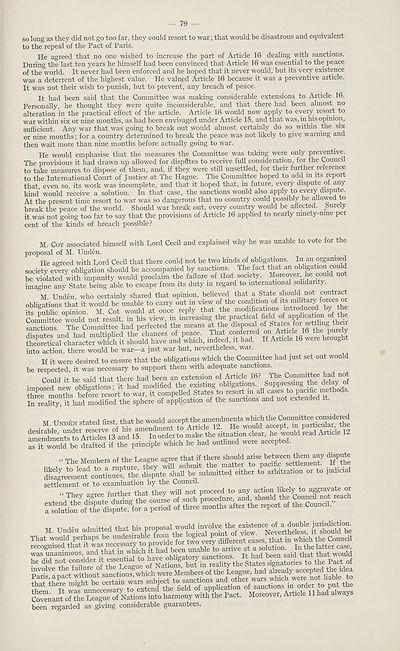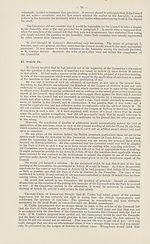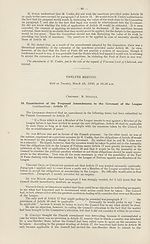Legal > Committee for the amendment of the Covenant of the League of Nations in order to bring it into harmony with the pact of Paris
(83)
Download files
Complete book:
Individual page:
Thumbnail gallery: Grid view | List view

— 79
so long as they did not go too far, they could resort to war; that would be disastrous and equivalent
to the repeal of the Pact of Paris.
He agreed that no one wished to increase the part of Article 16 dealing with sanctions.
During the last ten years he himself had been convinced that Article 16 was essential to the peace
of the world. It never had been enforced and he hoped that it never would, but its very existence
was a deterrent of the highest value. He valued Article 16 because it was a preventive article.
It was not their wish to punish, but to prevent, any breach of peace.
It had been said that the Committee was making considerable extensions to Article 16.
Personally, he thought the}^ were quite inconsiderable, and that there had been almost no
alteration in the practical effect of the article. Article 16 would now apply to every resort to
war within six or nine months, as had been envisaged under Article 15, and that was, in his opinion,
sufficient. Any war that was going to break out would almost certainly do so within the six
or nine months; for a country determined to break the peace was not likely to give warning and
then wait more than nine months before actually going to war.
He would emphasise that the measures the Committee was taking were only preventive.
The provisions it had drawn up allowed for disputes to receive full consideration, for the Council
to take measures to dispose of them, and, if they were still unsettled, for their further reference
to the International Court of Justice at The Hague. The Committee hoped to add m its report
that, even so, its work was incomplete, and that it hoped that, in future, every dispute o± any
kind would receive a solution. In that case, the sanctions would also apply to every dispute.
At the present time resort to war was so dangerous that no country could possibly be allowed to
break the peace of the world. Should war break out, every country would be affected. Surely
it was not going too far to say that the provisions of Article 16 applied to nearly mnety-mne per
cent of the kinds of breach possible?
M. Cot associated himself with Lord Cecil and explained why he was unable to vote for the
proposal of M. Unden.
He agreed with Lord Cecil that there could not be two kinds of obligations. In an organised
society every obligation should be accompanied by sanctions. The fact that an obligation could
be violated with fmpunity would proclaim the failure of that society. Moreover he could not
imagine any State being able to escape from its duty m regard to international solidarity.
M Unden, who certainly shared that opinion, believed that a State should not contract
obligations that it would be unable to carry out in view of the condition of its military forces or
its public opinion. M. Cot would at once reply that the modifications introduced by the
Committee would not result, in his view, in increasing the practical ““f^rsettlU their
sanctions The Committee had perfected the means at the disposal of Stages for settling t
^pTes and had multiplied the" chances of peace^ That conferred on Article 16 the^urdy
theoretical character which it should have and which, indeed, it had. If Article 16 were broug
into action, there would be war—a just war but, nevertheless, war.
If it were desired to ensure that the obligations which the Committee had just set out would
be respected, it was necessary to support them with adequate sanctions.
Could it be said that there had been an extension of Article 16? The Committee had not
imposed new obligations; it had modified the existing obligations. Suppressing the delay o
In'reaUty^i^had^modified'the ^re 0^“ ttJZctZ! andTot Sed it.
„ T. „ Members of the League agree that if there should arise between them any dispute
,.. , a runtare they will submit the matter to pacific settlement. If the
dt—lnf contoes, the dispute shall be submitted either to arbitration or to judical
settlement or to examination by the Council.
“ They agree further they ^l not pmceed to any ^“"hfcou^ltac”
:1^eo^d4u”gfora pS 0of three^nonths after the report of the Council.”
M. Unden admitted that proposal would ^
been regarded as giving considerable guarantees,
so long as they did not go too far, they could resort to war; that would be disastrous and equivalent
to the repeal of the Pact of Paris.
He agreed that no one wished to increase the part of Article 16 dealing with sanctions.
During the last ten years he himself had been convinced that Article 16 was essential to the peace
of the world. It never had been enforced and he hoped that it never would, but its very existence
was a deterrent of the highest value. He valued Article 16 because it was a preventive article.
It was not their wish to punish, but to prevent, any breach of peace.
It had been said that the Committee was making considerable extensions to Article 16.
Personally, he thought the}^ were quite inconsiderable, and that there had been almost no
alteration in the practical effect of the article. Article 16 would now apply to every resort to
war within six or nine months, as had been envisaged under Article 15, and that was, in his opinion,
sufficient. Any war that was going to break out would almost certainly do so within the six
or nine months; for a country determined to break the peace was not likely to give warning and
then wait more than nine months before actually going to war.
He would emphasise that the measures the Committee was taking were only preventive.
The provisions it had drawn up allowed for disputes to receive full consideration, for the Council
to take measures to dispose of them, and, if they were still unsettled, for their further reference
to the International Court of Justice at The Hague. The Committee hoped to add m its report
that, even so, its work was incomplete, and that it hoped that, in future, every dispute o± any
kind would receive a solution. In that case, the sanctions would also apply to every dispute.
At the present time resort to war was so dangerous that no country could possibly be allowed to
break the peace of the world. Should war break out, every country would be affected. Surely
it was not going too far to say that the provisions of Article 16 applied to nearly mnety-mne per
cent of the kinds of breach possible?
M. Cot associated himself with Lord Cecil and explained why he was unable to vote for the
proposal of M. Unden.
He agreed with Lord Cecil that there could not be two kinds of obligations. In an organised
society every obligation should be accompanied by sanctions. The fact that an obligation could
be violated with fmpunity would proclaim the failure of that society. Moreover he could not
imagine any State being able to escape from its duty m regard to international solidarity.
M Unden, who certainly shared that opinion, believed that a State should not contract
obligations that it would be unable to carry out in view of the condition of its military forces or
its public opinion. M. Cot would at once reply that the modifications introduced by the
Committee would not result, in his view, in increasing the practical ““f^rsettlU their
sanctions The Committee had perfected the means at the disposal of Stages for settling t
^pTes and had multiplied the" chances of peace^ That conferred on Article 16 the^urdy
theoretical character which it should have and which, indeed, it had. If Article 16 were broug
into action, there would be war—a just war but, nevertheless, war.
If it were desired to ensure that the obligations which the Committee had just set out would
be respected, it was necessary to support them with adequate sanctions.
Could it be said that there had been an extension of Article 16? The Committee had not
imposed new obligations; it had modified the existing obligations. Suppressing the delay o
In'reaUty^i^had^modified'the ^re 0^“ ttJZctZ! andTot Sed it.
„ T. „ Members of the League agree that if there should arise between them any dispute
,.. , a runtare they will submit the matter to pacific settlement. If the
dt—lnf contoes, the dispute shall be submitted either to arbitration or to judical
settlement or to examination by the Council.
“ They agree further they ^l not pmceed to any ^“"hfcou^ltac”
:1^eo^d4u”gfora pS 0of three^nonths after the report of the Council.”
M. Unden admitted that proposal would ^
been regarded as giving considerable guarantees,
Set display mode to:
![]() Universal Viewer |
Universal Viewer | ![]() Mirador |
Large image | Transcription
Mirador |
Large image | Transcription
Images and transcriptions on this page, including medium image downloads, may be used under the Creative Commons Attribution 4.0 International Licence unless otherwise stated. ![]()
| League of Nations > Legal > Committee for the amendment of the Covenant of the League of Nations in order to bring it into harmony with the pact of Paris > (83) |
|---|
| Permanent URL | https://digital.nls.uk/191509891 |
|---|
| Shelfmark | LN.V |
|---|
| Description | Over 1,200 documents from the non-political organs of the League of Nations that dealt with health, disarmament, economic and financial matters for the duration of the League (1919-1945). Also online are statistical bulletins, essential facts, and an overview of the League by the first Secretary General, Sir Eric Drummond. These items are part of the Official Publications collection at the National Library of Scotland. |
|---|---|
| Additional NLS resources: |
|

